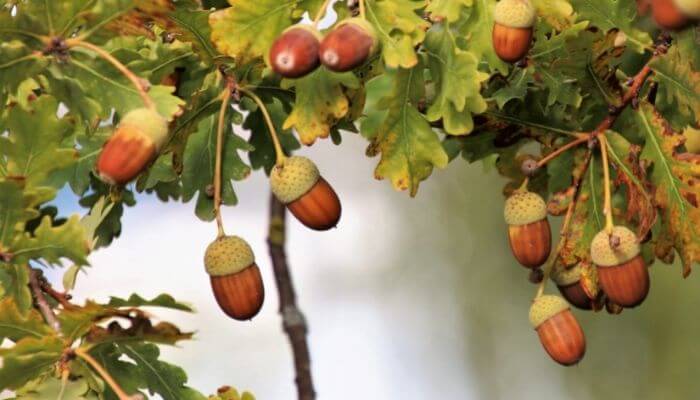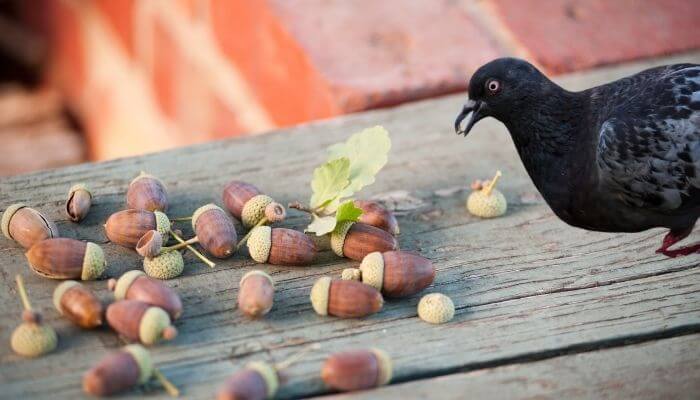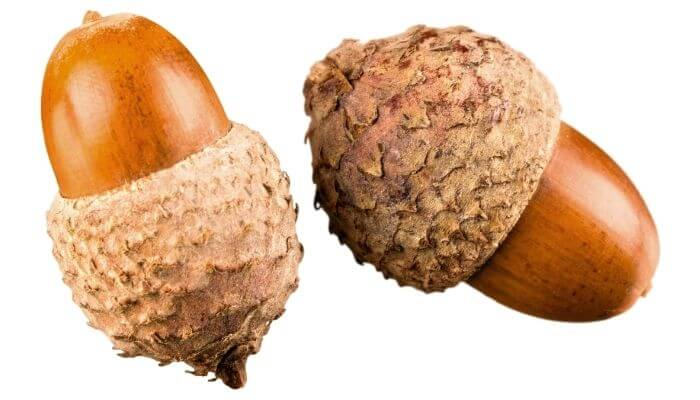So, the not so simple answer to this short question is… maybe!
There are conflicting and varying opinions on the subject of whether or not pigeons should be eating acorns.
They are widely available in the wild wherever there are oak trees (very abundant in the UK for example), but there is a valid scientific reason why many pigeon lovers don’t want their birds to eat them.
Acorns are essentially a seed and as pigeons are granivorous birds, it would seem acorns could be included in their diet.
What a pigeon eats is governed by the dexterity of its beak so if the pigeon is equipped to eat acorns, what is the issue?
Acorns contain a chemical called tannins.
Tannins are very low-grade toxins that, if consumed in sufficient quantity can have negative effects on a pigeon.
There are two types of acorns – red and white. Red acorns contain higher levels of tannins than white, but the red may contain more protein, calories, fibre and fats (as is general with all red-coloured foods).

It’s a matter of size – for humans and larger animals, such small amounts of tannins like those found in acorns would not have any kind of adverse effect, but for a small to medium-sized pigeon with a significantly smaller set of organs and digestive system, this quantity of tannins can prove seriously detrimental to health.
Science has also shown that green (unripe) acorns are not the best choice for a pigeon.
A study in 2000 looked at the death of two pigeons caused by a specific chemical that is highly concentrated in green (raw) acorns – pyrogallol.
What Other Foods Contain Tannins?
If you want to be extra careful about what you are letting your pigeons eat, then it is worth knowing about some of the other items that also contain a potentially dangerous quantity of tannins.
Some of these food items include:
- Apple seeds
- Grape seeds
- Peach pits
Granted, these aren’t necessarily the kinds of ingredients that pigeons are going to opt for first when there is more preferable food available, but apple seeds and peach pits also contain cyanide so are simply not good food for pigeons at all.
If you are going to feed fruit to a pigeon, remove the seeds of apples and stone fruit before chopping into manageable pieces.
Why Do Some People Still Give Acorns To Pigeons?
So, after all of this information, you might be wondering why people still ignore the advice and continue to allow their birds to eat acorns?

The answer is that some of the research that went into those broad discoveries and statements has recently been disputed.
The argument that the levels of tannins within acorns is enough to cause harm to a pigeon has been rejected by some, with a competing study actually putting forth the hypothesis that tannin, in general, was actually safe for pigeons and other birds to consume!
So, what should you do if one person is telling you that acorns are poisonous and another person is telling you that they are absolutely fine?
Being the bird lovers that we are, we always tend to favour the side of caution in debates like this.
There is no doubt that acorns contain a certain concentration of tannins, so if you want to stay on the safer side and not tempt fate with any kind of toxic reaction, then it’s simply the better idea to remove acorns from your pigeon’s diets.

If you keep pigeons and you have an oak tree in your garden, you need to consider the safety of them co-habiting.
Acorns can be made more palatable (for humans too) by reducing the potentially harmful effects of the tannins by leaching them in hot water.
Are There Acorn Alternatives?
The question isn’t really an issue because, for most domesticated pigeons, there shouldn’t be a need for a substitute. Acorns can be completely omitted from a domesticated pigeon’s diet without any nutritional detriment.
Acorns do not provide any more vitamins a pigeon needs if they are being fed a regular diet. If however, you want to provide nuts, all the following are better than acorns:
- Almonds
- Beechnuts
- Brazil nuts
- Hickory nuts
- Macadamia nuts
- Pecans
- Pine nuts
- Walnuts
These can all be sourced individually if your bird suddenly adopts a favourite kind of nut, but the best way to make sure they get to sample a little bit of everything is to buy a big bag of nut mix that is specially designed and created with the balanced and enjoyable diet of a bird in mind.
Over time, you might start to notice if any specific nuts are being ignored!
Conclusion
It’s fair to say that the jury is still very much out on whether acorns should be on the yes or no list for a pigeon’s diet.
In the wild, pigeons are opportunistic feeders that will eat what they can, where they can, but from a cautious bird owner’s point of view, when there are so many other, proven safer options when it comes to pigeon food, it doesn’t make much sense to risk the tannin consumption.
